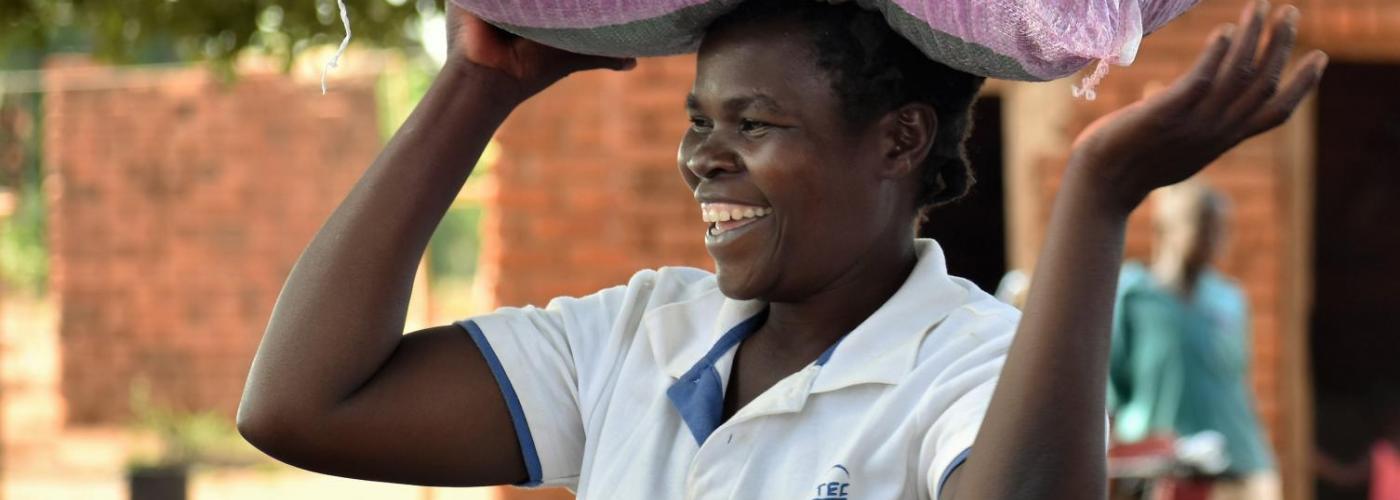Transforming Lives with Improved Agricultural Inputs
Image

This post was authored by Joni Waldron from Palladium.
You have probably heard some variation of the saying, “you only get out [of life] what you put in.” In Malawi, smallholder farmers put a tremendous amount of time and labor into producing crops. They work long hours—sunrise to sunset and then some—often six or seven days a week, trying to get the most out of what land they have.
However, despite these farmers’ best efforts, yields of staple crops like maize and cash crops like groundnut and soybean remain frustratingly low: farmers in Malawi harvest 15 percent less groundnut and 77 percent less soybean per hectare than the average southern African farmer. Compared with their counterparts in neighboring countries, smallholder farmers in Malawi often lack basic agricultural inputs—improved seed, fertilizer, and technologies like inoculant—that are considered indispensable by commercial farmers in other countries.
There are many reasons why farmers don’t purchase quality inputs—including the high cost and lack of financing, perceived low return on investment, and distance to agri-dealers. These barriers lead nearly 80 percent of Malawian farmers to procure their seed informally—either from informal markets or saved and recycled from their previous year’s harvest. The use of informal seed is the most significant factor contributing to low and declining yields for Malawian farmers.
Lidesi Meyasi, from Masula Village in Lilongwe, describes the challenges faced by smallholder farmers like her: “Two years ago, I attempted to grow groundnuts. I used recycled seed, which I bought from the local market, and harvested 11 bags of unshelled groundnuts. But last year, I did not grow because I did not have money to buy seed—I could not even afford to buy recycled seed from the local market.” Despite her desire to grow groundnuts again in 2019, Lidesi didn’t think she would have the opportunity: “I had no plans to grow groundnuts, because I didn’t know where to get seed.”
Responding to Farmers' Needs
To address this gap, the Feed the Future Malawi Ag Diversification Activity (AgDiv) worked with partners from the private sector—SeedCo, Good Nature Agro, Malawi Fertilizer Company, and Mandolo Plus—and with a microfinance institution called Community Finance to develop an input bundle and a loan package to help farmers like Lidesi access productivity-enhancing technologies. AgDiv is now delivering this package to smallholder farmers through private sector partners Pyxus, Limbe Leaf Universal, and Horizon Farming Limited, as well as 27 farmer associations and cooperatives. In addition to certified seed, the loan package includes legume inoculant-appropriate fertilizer blends. With the right input package, these farmers are expected to increase their groundnut and soybean yields from the Malawian averages of less than 1 metric tons per hectare to approximately the global averages of 1.7 metric tons for groundnuts and 2.7 metric tons for soybeans.
One of the unique features of this input package is that each recipient farmer gains access to a guaranteed off-take market—in the form of a trading platform provided by Tradeline Corporation, contracts from Pyxus and Limbe Leaf, or an off-take agreement from Horizon Farming Limited. This reduces the risk to farmers of investing in productivity-enhancing interventions by ensuring that they will have a market to sell any excess they produce.
In the second week of November, AgDiv and its partners began distributing $3.1 million worth of certified seed and complementary inputs to nearly 20,000 smallholder farmers engaged in soybean and groundnut farming. For Lidesi, this opportunity couldn’t have come at a better time. “I’m so happy—now that I will use certified seed, I expect my groundnuts yield to increase,” she says. After receiving an input loan package— which includes 40kg of certified groundnut seed, 80kg of fertilizer, and three sachets of inoculant—Lidesi expects to harvest at least 15 bags of groundnut compared to the 11 she harvested two year ago. That is enough to pay back her $85 loan and provide enough additional income to finally put a modern iron-sheet roof on her home. “This is my year of transformation,” she says.
Palladium implements AgDiv for USAID.
|
Input Loans: By the Numbers (Malawi) |
|
Projected number of loan recipients: 19,216 |
|
Total projected value of improved inputs: $3.1 million |
|
Estimated land under improved cultivation: 7,720 hectares |
|
Estimated additional earnings per hectare (groundnuts): $343 |
|
Estimated additional earnings per hectare (soybeans): $85 |

